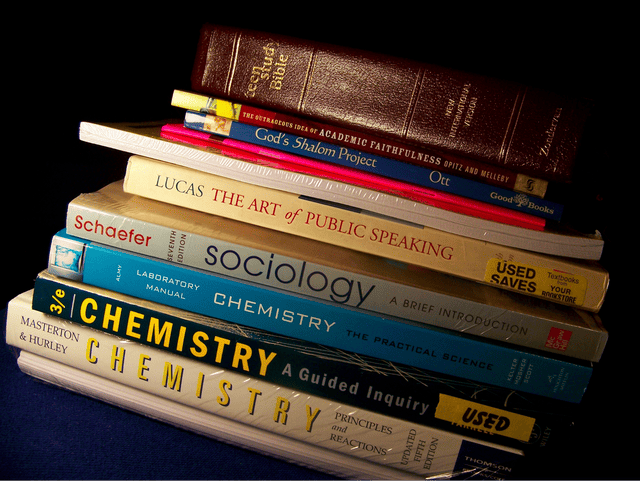College textbooks are, technically speaking, freaking expensive. The average undergraduate spends around $1,200 annually on books. This can be as much as 40% of total costs for those at community colleges.
Given long-term trends in textbook price growth, in a decade, we might find that $1,200 a comparative pittance. All education costs have risen over the last 40 years, but nothing compares to the surge in the cost of textbooks: they have increased 812% since 1978, and in the last several years, costs are rising as sharply as ever.
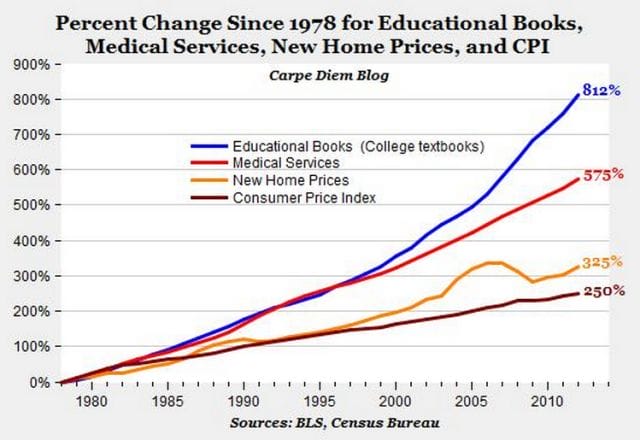
Though costly for all students in general, the expenses for textbooks for certain majors are particularly high. By our calculations, there are certain majors for which the textbooks in the average class costs four times the amount of the least expensive ones.
In order to assess which majors have the most expensive textbooks, we used data from the University of Virginia’s (UVA) textbook list. This list includes all of the textbooks for courses in the Fall 2015 semester (we used a list updated on August 21st). The textbook list includes nearly 5,000 textbooks from over 750 different courses. Of course, these results are specific to UVA, but they can provide a glimpse into the textbook costs facing US college students more generally.
The following chart shows the average total cost of textbooks per class for major departments. We assume that all books are bought new, and that students buy all required and optional textbooks. Used books at the UVA bookstore are generally ¾ of the price a new book.
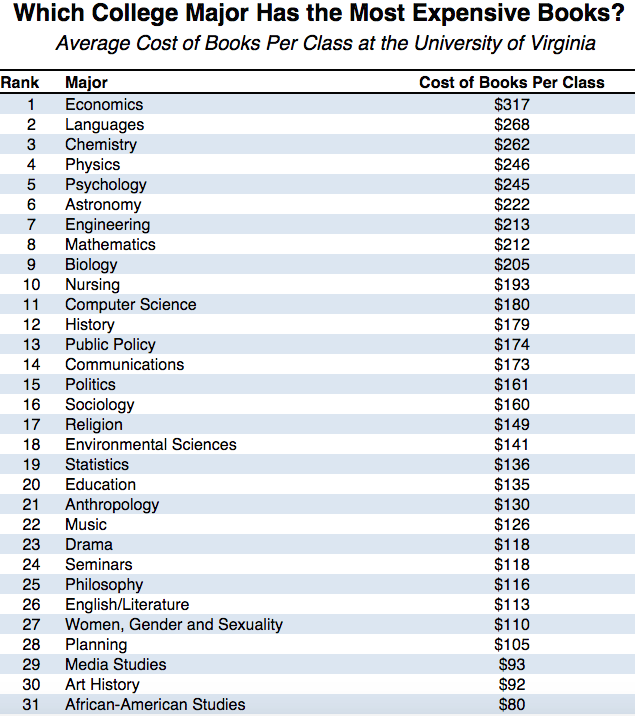
Dan Kopf, Priceonomics; Data: UVA
Economics classes, ironically, have the most expensive books per class at $317 per class. The department with the classes that are least expensive for books is African-American Studies, at $80. A general rule is that sciences/social sciences have substantially more expensive books than the humanities. Languages, second on this list, is an exception to this rule.
We also analyzed the price of the average book by department. The order of the list is similar, with slight differences due to fewer texts being required in some disciplines. The average new book for a Physics class is $158 and $124 for Engineering books. English/Literature books are, on average, the least expensive at $19, though students are expected to buy far more books in these classes. The chart below shows the average price of a book for major departments.
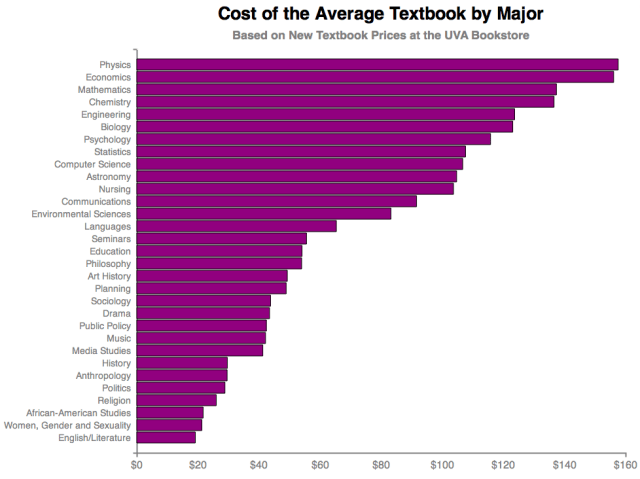
Dan Kopf, Priceonomics; Data: UVA
There are some incredibly expensive books students are asked to purchase — none more expensive than Garrett and Grisham’s Biochemistry. At the UVA Bookstore Biochemistry will set a student back over $400. There are around 200 books in the UVA textbook list that cost over $200 to purchase new.
The following list shows the ten most expensive textbooks UVA students are asked to purchase:
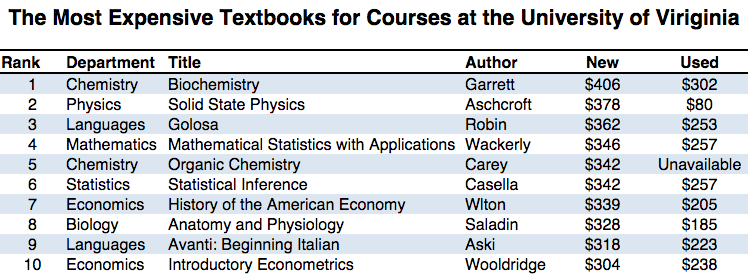
Dan Kopf, Priceonomics; Data: UVA
Of course, you can always try to sell your textbooks to offset some of the original expense. But again, depending on your major, you may recoup more or less of your initial expense.
We analyzed data from the website of textbook retailer Valore Books to learn which subjects’ books obtain the largest payback. We took the top 50 books for different areas of study and obtained the price to purchase the book used and the original “list price.” The chart below shows in which areas books keep the most value.
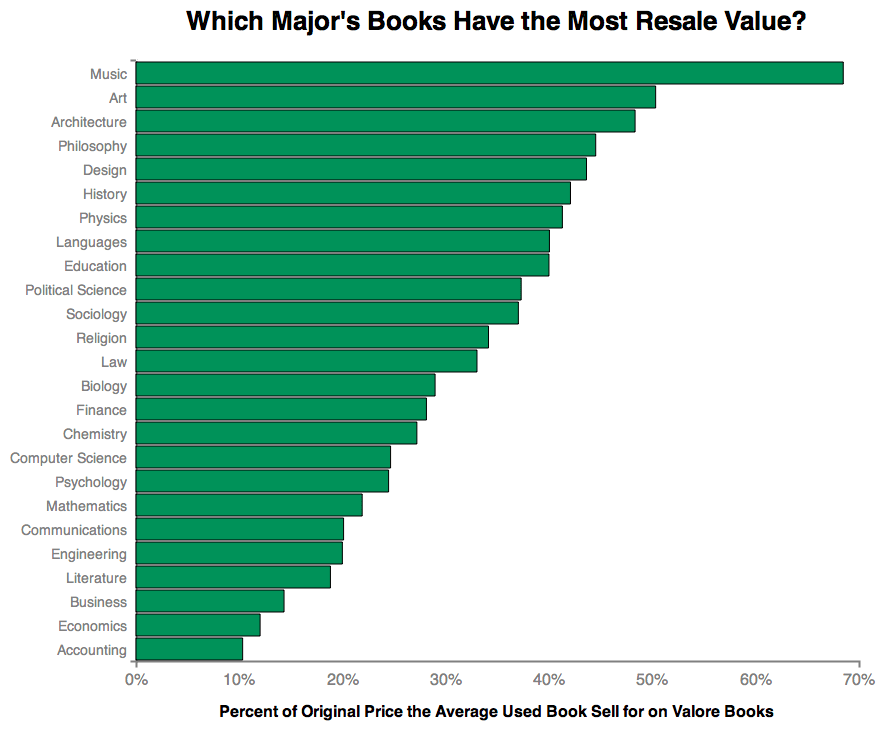
Dan Kopf, Priceonomics; Data: Valore Books
By this measure, Accounting books retain less of their value than any other subject type, with books selling at 10% of their original list price. Music students are in luck. With by far the highest retained value, Music textbooks sell for 68% of their original list price. Again, we see a humanities versus science/social science divide. The science/social science books, which are usually most expensive new, retain proportionally the least amount of their original price, while the relatively inexpensive humanities books lose less value. In the battle for supremacy between science and the humanities, we can count this one for the latter.
***
In the eyes of many, the cost of textbooks has gotten absurd. On top of rising tuition costs, the prices for textbooks can feel like a slap in the face.
In order to avoid these costs, many students choose to buy used books, rent books, or pray the library has a book when they need it. There are also advocates pushing for professors to choose open textbooks (textbooks for which there is no copyright).
Though it may limit your long-term earnings potential, our analysis suggests another way to lower your textbook costs is to choose a major in the humanities.
Our next post examines why honorary degrees are on the rise. To get notified when we post it, join our email list.
![]()
This post was written by Dan Kopf; follow him on Twitter here.




